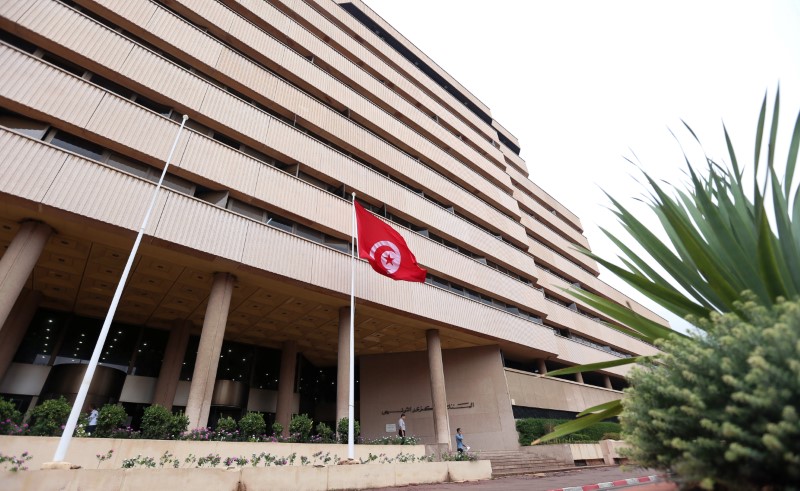By Tarek Amara and Angus McDowall
TUNIS (Reuters) - Tunisia will issue debt worth up to $3 billion this year and aims to roll over some existing credit arrangements while setting in train wider economic reforms, Finance Minister Ali Kooli told Reuters in an interview.
With a deficit estimated at 11.5% of gross domestic product last year and public debt at 90% of GDP, Tunisia plans reforms to cut its high public wage bill and subsidies and restructure poorly performing state-owned companies, Kooli said.
The COVID-19 pandemic, political infighting and ongoing protests over inequality have added to the pressure on the government, while foreign lenders and the powerful labour union have often made competing demands on reform.
"Our situation is tough, but it doesn't mean that we aren't in a position to pay salaries or reimburse our debt", said Kooli, adding that Tunisia could comfortably meet repayments due in the first half of 2021.
Tunisia's 2021 budget forecasts borrowing needs at 19.5 billion Tunisian dinars ($7.2 billion), including about $5 billion in foreign loans. It puts debt repayments due this year at 16 billion dinars, up from 11 billion dinars in 2020.
Kooli said Tunisia wants a new $1 billion loan guarantee arrangement from the United States, which he said could help it secure the $3 billion in bond issuance, the first time he has given that figure.
The government also hopes to reach agreement with the International Monetary Fund on a new financing programme, and he said recent Article IV consultations were a step towards that.
However, Kooli said Tunisia had not yet decided how much new international debt to seek and that it was taking steps to improve its credit rating and gain IMF blessing for the move.
"I believe there is a real possibility to go to the markets for at least $1 billion during 2021," he said, adding that the higher sum of $3 billion would also be possible.
Tunisia is looking at various instruments including a sukuk for the first time, a club deal, a specific action for the Asian market or a dollar-denominated bond issue, Kooli said, without elaborating.
The government may also issue, separately, a sukuk for the domestic market before July, he said, adding that it could be in the region of around 300 million dinars.
REFORMS
Tunisia will switch to targeted subsidies in coming months, he said, and will announce restructuring plans for state-owned companies after Ramadan, which this year ends in mid-May.
However, the pandemic may delay some reforms both to avoid increasing the economic pain for ordinary Tunisians and because it is not a good time to attract potential investment in state companies.
Targeted subsidies will involve distributing digital cards for lower-income Tunisians as well as other measures, he said.
However, the government is still assessing how many people require help, what price different products should be and how to avoid a big rise in inflation, he said.
Although Prime Minister Hichem Mechichi has already announced a new unit to take over state-owned companies from direct control by government ministries, the details of reforms will not be announced until they are finalised, Kooli said.
He confirmed the government would sell its share in some firms but did not identify them. He questioned whether the state needed to hold minority shares in companies, whether it needed to own stock in 12 banks, as now, or in gambling.
Any revenues raised by privatisation would be pumped back into other state-owned companies that the government wants to restructure, he said.
Tunisia's main labour union, the UGTT, has previously resisted any privatisation, but Kooli said he expected no trouble there, adding the government was "not looking for a fight".
On the public sector wage bill, Kooli said the government was looking at different ways to reduce it, for example by offering slightly lower pay for greatly reduced hours.
"The possibility to work half time and be paid a little bit more than half salary is an avenue we are considering," he said.
($1 = 2.7014 Tunisian dinars)
